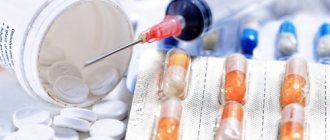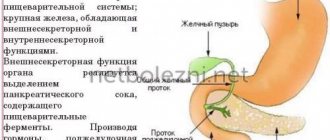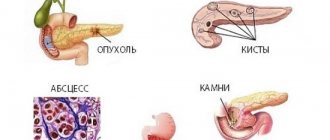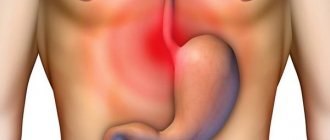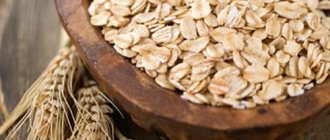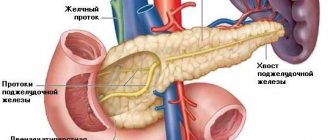Who needs liver and pancreas treatment and how?
The principles of treatment are determined by the form and nature of the disease. The treatment of pathologies of the hepatobiliary system (liver, bile ducts) and pancreas includes combined regimens:
- pharmacotherapy – taking medications;
- diet therapy – a gentle diet that prevents stress on damaged organs;
- surgical intervention - removal of gallstones, complete or partial excision of the pancreas, etc.
If the disease becomes chronic, in 94% of cases drug therapy is limited. The drugs are prescribed to patients with the following diseases:
- pancreatitis;
- viral hepatitis;
- cholecystitis;
- fatty infiltration of the liver;
- pancreatic steatosis;
- hepatic cirrhosis;
- diabetes;
- cystic fibrosis;
- cholelithiasis;
- non-parasitic parenchymal cysts;
- cholestasis.
Medicine for the liver and pancreas is selected by a gastroenterologist based on medical history and a comprehensive examination. To normalize the functions of the affected organs, different groups of drugs are prescribed - hepatoprotectors, enzymes, sorbents, vitamin-mineral complexes, antibacterial and antiviral agents.
Delayed treatment of diseases is dangerous due to life-threatening complications - calculous cholecystitis, purulent inflammation of the gall bladder, renal failure, and oncological diseases.
Hepatoprotectors and choleretic
Hepatoprotectors are a group of drugs that prevent the destruction of liver cells and restore its functions. Due to this, the functioning of the hepatobiliary system is normalized, which has a beneficial effect on the secretory activity of the pancreas. Hepatoprotectors are divided into several categories:
- according to the principle of action - choleretic and antioxidant;
- composition - antioxidants/vitamins, essential phospholipids, amino acid derivatives;
- by origin - synthetic, plant, animal.
Drugs for the pancreas and liver are selected taking into account the causes and degree of organ dysfunction.
Plant based
Hepatoprotective medicines for the liver based on plant materials have a complex effect:
- protect against the toxic effects of drugs;
- normalize liver function;
- stimulate the formation of new cells;
- restore the structure of the parenchyma.
Herbal remedies are often used in the treatment of bile duct dyskinesia, cholecystitis, etc. Tablets based on milk thistle and artichoke have a choleretic effect. For liver pathology, the following are usually prescribed:
- Artichol is a choleretic hepatoprotector with artichoke extract that improves metabolism;
- Allochol - tablets with extract of dry bile, garlic and nettle, enhancing the synthesis of bile acids;
- Hepatrin is a drug with bile and diuretic activity that improves digestion in cholecystitis, hepatitis, and cirrhosis.
It is not recommended to use hepatoprotectors with a choleretic effect in case of relapse of pancreatitis.
With animal ingredients
Medicines for the treatment of the liver with substances of animal origin are used for toxic poisoning of the body, excessive chemical load on the hepatobiliary system. They contain animal liver extracts:
- Hepatosan - a drug with donor pig liver cells cleanses the body of toxins and prevents toxic damage to the parenchyma;
- Sirepar is a hepatoprotective agent with hydrolyzed liver extract, which accelerates the regeneration of liver tissue;
- Gepadif - capsules with antitoxic liver extract stimulate metabolism, cell renewal, and secretory activity of liver tissue.
Hepatoprotectors must be taken orally before meals 3-4 times a day. They are used in combination therapy of gastrointestinal pathologies caused by dysfunction of the pancreas, liver, and bile ducts.
Essential phospholipids
Liver preparations contain essential fats, which are involved in the synthesis of cell membranes, remove free radicals, and prevent fatty degeneration of the parenchyma. Such products increase the activity of enzyme systems and have a beneficial effect on the functioning of the gastrointestinal tract.
Hepatoprotectors to protect the liver:
- Essliver forte is a product with vitamins and phospholipids that restores the structure of hepatocytes and normalizes the tone of the bile ducts;
- Essentiale forte - capsules with choline and phospholipids that improve liver function during cirrhotic changes, fatty degeneration, toxic poisoning;
- Rezalut pro - a medicine with phospholipids from lecithin accelerates the regeneration of parenchyma and suppresses fibrotic changes in the liver.
Essential phospholipids are recommended for liver treatment in patients with alcohol dependence.
Amino acid derivatives
Amino acid preparations are the best medicines from the group of hepatoprotectors. They have combined properties:
- remove toxins;
- participate in the synthesis of phospholipids;
- accelerate the renewal of hepatocytes (liver cells);
- stimulate lipid metabolism;
- reduce serum cholesterol levels.
To restore the liver and pancreas, the following are used:
- Heptral - tablets with ademetionine, stimulating metabolism and digestion in case of liver dysfunction;
- Hepa-Merz is a drug with ornithine, which accelerates metabolism and is involved in the synthesis of insulin;
- Hepasol A is a solution for parenteral nutrition with L-arginine, which cleanses the pancreas and liver of toxins and stimulates organ regeneration.
Hepatoprotectors with amino acids are not used for protein metabolism disorders.
With bile acids
Preparations with bile acids additionally contain extracts from herbs, vitamins, extracts of the pancreas and liver of cattle, activated carbon, etc. They are used to treat and prevent gallstone disease and calculous cholecystitis.
Medicines for the prevention and treatment of liver pathologies:
- Ursosan - reduces the cholesterol content in bile, facilitating its removal from the bile ducts;
- Ursodex - prevents the saturation of bile with cholesterol and its stagnation in the gallbladder;
- Grinterol - improves the secretory activity of liver cells, reduces the viscosity of bile and accelerates its removal into the intestines.
Medicines with bile acids are indicated for combined diseases of the pancreas and liver - hepatobiliary disorders associated with cystic fibrosis, idiopathic cirrhosis, reflux gastritis, etc.
Other options
Often, dysfunction of the organs of the hepatobiliary system occurs due to hypovitaminosis and decreased immunity. Therefore, to improve liver function, hepatoprotectors with different therapeutic properties are used:
- Galstena is a combination medicine with hepatoprotective, choleretic, and anti-inflammatory activity. Used for chronic inflammation of the pancreas, biliary dyskinesia, etc.
- Nicodin is a drug with bacteriostatic and choleretic action, which reduces inflammation and facilitates the emptying of the gallbladder;
- Flacumin is a cholespasmolytic medicine that reduces spasms in the bile ducts.
Drugs to stimulate bile synthesis (choleretics), enhance its outflow (cholekinetics), and reduce spasms in the ducts (cholespasmolytics) are prescribed for the same diseases. But the principles of their action have significant differences. Therefore, before taking hepatoprotectors, you should consult a gastroenterologist.
What are the signs of liver dysfunction?
In the absence of liver pathology, proper functioning is affected by nutrition, large amounts of alcohol consumed, the use of medications, and stress.
Signs of liver fatigue are:
Treatment of the liver after antibiotics
- feeling of heaviness in the hypochondrium on the right;
- lack of mood, depression;
- darkening of urine;
- the appearance of itchy skin rashes, spider veins, age spots, acne;
- increased frequency of migraine-type headaches;
- change in facial skin color to a dull, earthy tone;
- dark circles under the eyes;
- decreased appetite, feeling of bitterness in the mouth;
- sometimes temporary nausea, belching;
- unpleasant odor from sweat and breath.
These signs, in the absence of other diseases, indicate a decrease in the functional state of the liver.
Correctly selected combinations of vitamins and diet will help lift your mood.
Enzymatic preparations to improve digestion
Enzyme preparations are a group of pharmacological agents that stimulate digestion. Restore pancreatic functions and reduce the load on the gastrointestinal tract. Appointed for:
- cystic fibrosis;
- pancreatitis;
- irritable bowel syndrome;
- severe hepatitis;
- atrophic gastritis;
- biliary cirrhosis, etc.
For pancreatic insufficiency, medications that contain digestive enzymes are prescribed:
- pepsin;
- pancreatic enzymes;
- disaccharides;
- combined enzymes.
Systematic intake of enzyme agents normalizes the functioning of the pancreas and the production of gastric juice.
Festal
Pancreatin-based tablets accelerate the digestion of lipids, proteins, carbohydrates, and fiber. Reduces the load on the pancreas and liver and prevents constipation. Festal is prescribed for:
- pancreatitis;
- ulcerative colitis;
- flatulence;
- pancreatic insufficiency.
A drug for the treatment of gastrointestinal disorders is taken 1 tablet after the main meal.
Mezim forte
The medicine contains excretory enzymes that stimulate metabolism. Trypsin, lipase and amylase facilitate digestion in diseases of the liver and pancreas - pancreatitis, biliary dyskinesia, cholelithiasis, etc. Take 1-2 tablets with meals.
Mezim Forte is contraindicated in cases of intestinal obstruction, severe liver failure, and acute pancreatitis.
Pancreazim
A multienzyme drug with pancreatin is prescribed for pancreatic pathology. Partially compensates for its functions, accelerates the digestion of proteins and the absorption of vitamins from the small intestine. Pancreazym is prescribed for:
- insufficient synthesis of digestive enzymes;
- functional intestinal disorders;
- bloating.
The daily dose of Pancreazym is 2-4 tablets. Take with food.
Pancreatin
Like other inexpensive enzyme products, Pancreatin contains extracts from the pancreas of cattle and pigs - chymotrypsin, lipase. They stimulate the digestion of food, reduce the load on the gastrointestinal tract, liver and pancreas. Pancreatin is recommended for digestive disorders and heavy meals. Children over 6 years old and adults are prescribed 1-2 tablets after meals.
Panzinorm
Panzinorm is an effective medicine for digestive disorders. Compensates for pancreatic insufficiency in gastrointestinal diseases. Pork pancreatin is the active ingredient of the drug. Prescribed to enhance digestion when:
- sluggish pancreatitis;
- cystic fibrosis;
- operations on the gastrointestinal tract;
- removal of the pancreas.
To normalize stool and prevent fermentation in the intestines, take 1-2 capsules after meals. For serious pathologies, the dosage and duration of treatment is determined by a gastroenterologist.
Nausea, loose stools, fatigue and vomiting are symptoms of an overdose of Panzinorm. If you feel worse, you should stop therapy and consult a doctor.
Additional enzyme medications
To restore the functions of the digestive system, the following enzymatic agents are usually prescribed:
- Solizim;
- Digestal;
- Pepphys;
- Creon;
- Enzistal;
- Wobenzym;
- Pankurmen;
- Oraza, etc.
Enzyme-based drugs have high bioactivity. Long-term treatment is dangerous due to damage to the oropharyngeal mucosa. Therefore, tablets and capsules should not be chewed and washed down with plenty of water.
With exacerbation of pancreatitis
Compliance with medical recommendations and diet helps to quickly relieve inflammation of the pancreas. An exacerbation of the disease is possible if the patient refuses to take medications or does not adhere to nutritional rules. Enzyme preparations and the following supplements help achieve remission:
- Duovit;
- Retinol acetate;
- Antioxicaps.
Duovit
The combined preparation contains all the necessary vitamins for pancreatitis and gastritis - A, E, D, C and group B. It improves the digestion process and promotes tissue restoration. Produced in the form of dragees, 40 pcs. for packaging. Price – 185-250 rub. With long-term use, skin rash and exacerbation of asthma are possible. Duovit is contraindicated if the composition is intolerant.
Retinol acetate
This is vitamin A in capsules of 3.3 thousand IU in one piece. The drug has a general strengthening effect, has antioxidant properties, and improves fat metabolism. Price per pack of 10 pcs. – 7-20 rub. Retinol acetate is contraindicated in chronic pancreatitis. May provoke the following adverse reactions:
- lethargy;
- headache;
- drowsiness;
- nausea;
- vomiting;
- skin rash;
- facial redness;
- leg muscle soreness.
Antioxicaps
This drug stimulates the immune system, improves the synthesis of collagen and pancreatic hormones. It contains ascorbic acid, alpha-tocopherol, beta-carotene. Antioxicaps is available in capsules of 20 pcs. Rarely found in Moscow pharmacies. The drug is contraindicated in case of intolerance to the composition. Sometimes allergies occur after taking it.
Sorbents
Sorbents are drugs for the treatment of the liver and pancreas that absorb and remove toxins from the body. Used in the treatment of gastrointestinal disorders and food poisoning. The list of the best products includes sorbents with activated carbon, lactulose, and silicon dioxide.
Sorbing activity is associated with the following principles of drug action:
- absorption of poisons, allergens and pathogens;
- improved digestion by increasing the concentration of pancreatic enzymes in the gastrointestinal tract;
- stimulation of metabolism and elimination of toxins in feces.
Many enterosorbents prevent the reabsorption of toxins into the blood from the intestines.
Sorbex
Capsules with activated carbon adsorb liquid and gaseous toxins and accelerate the removal of metabolic products from the gastrointestinal tract. Sorbex reduces the toxic effect on the liver and is prescribed for:
- chronic poisoning;
- long-term treatment with medications;
- infectious diseases of the gastrointestinal tract;
- acute and chronic damage to the pancreas, kidneys and liver.
In case of poisoning, take 2-6 capsules of Sorbex three times a day. The course of treatment is from 3 to 5 days.
Sorbents reduce the therapeutic activity of drugs. Therefore, they are taken 1.5-2 hours before or after taking other pharmaceuticals.
Polysorb
The powder for oral administration contains silicon dioxide, which removes bacterial and food allergens and toxic protein breakdown products from the intestines. The main purpose of taking Polysorb is to prevent pancreatic and liver dysfunction. The drug is included in the treatment of intestinal infections and viral hepatitis. Take 1.2 g of powder in the form of suspensions 50-60 minutes before meals. The maximum daily dose is 12 g.
Lactofiltrum
Plant sorbent with lactulose and lignin is used for:
- detoxification of the body;
- reducing the load on the liver;
- restoration of intestinal microflora.
Lactofiltrum is used in the treatment of hepatitis, pancreatitis, colitis, dysentery, etc. Adults take 2-3 tablets per day 60 minutes before meals.
Other enterosorbents
To cleanse the intestines of toxins and prevent functional disorders of the pancreas, the following are used:
- Enterosgel;
- Smecta;
- Polyphepan;
- Entegnin;
- Sorbolong;
- Enterosorb.
Food poisoning is treated with sorbents until diarrhea stops and signs of dyspepsia - belching, nausea - disappear.
What are "antivitamins"?
When it comes to the importance of vitamins, we must not forget about biochemical compounds that have the ability to destroy or destroy the effect of vitamins. They are called "antivitamins." Ascorbaxylase - has a negative effect on ascorbic acid outside the body during cooking. It is found in vegetables and juices.
Causes the oxidation of vitamin C and is significantly activated when heated. So, boiling the jam for three minutes “eats” 100% of ascorbic acid. The product, apart from its taste, has no beneficial properties. In 15 minutes, more than half of the ascorbic acid in beet juice is destroyed by oxidation.
Thiaminase is found in raw fish and eggs, rice, berries (currants, blueberries, cherries), coffee, Brussels sprouts. If you use only these products in your diet, the food will be deprived of vitamin B1. Their long-term storage leads to similar consequences.
When to take antibiotics and antiviral medications
Antimicrobial and antiviral agents are prescribed for infectious lesions of the pancreas or liver. Antibiotics are not used for hepatitis, as they do not affect the activity of viruses.
Antiviral therapy
If viruses are the cause of inflammation of the pancreas or liver parenchyma, immunostimulants are used:
- Interferon;
- Genferon;
- Viferon.
They stimulate the immune system, causing the body to produce more protective cells. For hepatitis C, medications with direct antiviral activity based on sofosbuvir, daclatasvir, alta-interferon are used:
- Hepsvir;
- Sovihep;
- Sofovir;
- Resof;
- Hepcinate;
- Viropak;
- Sophocyvitis, etc.
The treatment regimen for hepatitis C is determined only by a hepatologist. Irrational use of medications is dangerous due to complications.
Antibacterial treatment
Antibiotics are used to treat infections caused by bacteria. For cholecystitis and pancreatitis, penicillin drugs are prescribed:
- Augmentin;
- Ospamox;
- Panclave;
- Amoxin;
- Amoxiclav, etc.
During antibacterial therapy, patients are simultaneously prescribed probiotics - Enterozermina, Bionorm, Linex, etc. They prevent dysbiosis and intestinal hypovitaminosis.
Papaya
Papaya is more than a tasty tropical fruit that is good for your digestion.
Thanks to the flavonoids it contains, such as cryptoxanthin, we can reduce the level of “bad” cholesterol in the blood, stop cell oxidation and calm inflammatory processes in these organs.
Whenever you have the opportunity to purchase papaya, do not miss it. Your body will thank you very much for your attentive care. published by econet.ru
PS And remember, just by changing your consumption, we are changing the world together! © econet
Vitamin complexes and other medications
Many diseases of the pancreas and liver occur due to vitamin deficiency. To restore the metabolism and functions of the affected organs, vitamin and mineral complexes with tocopherol, inositol, B vitamins, ascorbic and folic acid are prescribed. Effective means include:
- Vitrum;
- Multitabs;
- Complivit;
- Merz;
- Doppelhertz;
- Alphabet.
To restore the liver in case of fatty degeneration of the parenchyma, lipoic acid preparations are prescribed - Alpha-Lipon, Thioctan, Biletan, etc.
Is it possible to determine which vitamin the liver lacks?
Of course, the best option is to do a blood test and find out whether it contains a sufficient amount of the vitamin. But due to the labor-intensive nature, such a study can only be carried out in specialized centers. Dietitians and nutritionists who deal with nutrition problems focus on the known symptoms of hypovitaminosis.
For example, vitamin deficiency:
- A - causes visual impairment, stunts the growth of children;
- D - softens the bone skeleton, in childhood it forms rickets, underdevelopment of teeth;
- K - reduces blood clotting, a person has visible bruises on the skin, has a tendency to nosebleeds, gums bleed and hurt;
- B2 - in people of a neurasthenic type, promotes hair loss, causes insomnia, disrupts the course of pregnancy;
- B1 - reduces mental abilities and physical strength.
